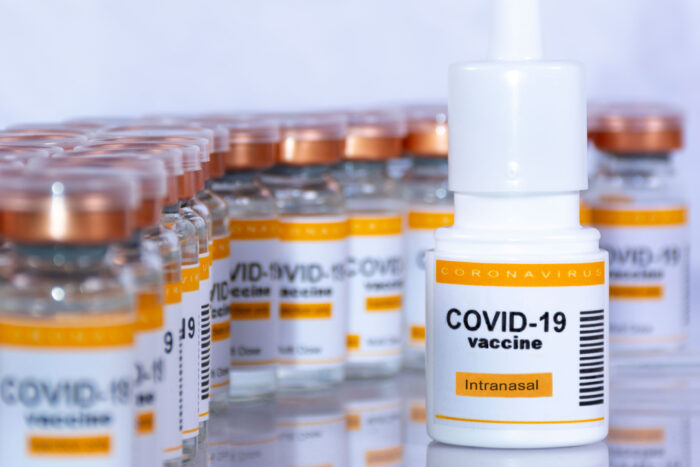Nasal COVID-19 vaccine based on WashU technology to enter U.S. clinical trials
Trial will assess safety, efficacy of next-generation vaccine given via nasal spray, inhalation
 Getty Images
Getty ImagesA nasal vaccine for COVID-19 – based on technology developed at Washington University in St. Louis – is poised to enter a phase 1 clinical trial in the U.S.
A nasal vaccine for COVID-19 – based on technology developed at Washington University in St. Louis – is poised to enter a phase 1 clinical trial in the U.S. after an investigational new drug application from Ocugen, Inc. was approved by the Food and Drug Administration (FDA). Ocugen, a U.S.-based biotechnology company, licensed the innovative technology from WashU in 2022.
The trial will be sponsored and conducted by the National Institute of Allergy and Infectious Diseases (NIAID), of the National Institutes of Health (NIH). The FDA’s action is a critical first step toward initiation of the phase 1 trial, planned for this spring.
While cases of COVID-19 have fallen dramatically since the early years of the pandemic, the virus continues to circulate and still causes significant illnesses and deaths. The nasal vaccine technology is designed to induce strong immunity in the nose and upper respiratory tract, right where the virus enters the body, thereby potentially stopping transmission of the virus in addition to reducing serious illness and death. Most COVID-19 vaccines are injected into the arm or leg, and while they are effective at reducing illness and death, they do not halt transmission. The new trial will evaluate the safety and efficacy of the vaccine administered via two routes: inhaled into the lungs and sprayed into the nose.
“I am delighted to see this nasal vaccination technology, created by scientists right here at WashU Medicine, advance toward clinical trials,” said Doug E. Frantz, PhD, the Vice Chancellor for Innovation and Commercialization at WashU. “This powerful technology has the potential not only to help control COVID-19 but to reduce the burden of respiratory infections worldwide. The technology could be adapted for other common respiratory viruses such as seasonal influenza, avian flu and respiratory syncytial virus (RSV) that cause enormous sickness and death.”
A version of the vaccine has been available in India since 2022 through a licensing agreement between WashU and the Indian biotechnology company Bharat Biotech.
The Phase 1 trial is funded through Project NextGen, a U.S. government agency initiative to develop next-generation COVID-19 vaccines and therapeutics through public-private partnerships.
The trial will enroll 80 adults ages 18 to 64 years. Participants will be randomly assigned to one of four groups: low-dose intranasal, high-dose intranasal, low-dose inhaled and high-dose inhaled. The primary aim of the trial is to determine safety, but researchers will also assess immunogenicity by measuring antibody production and efficacy by determining the number of breakthrough COVID-19 cases.
The investigational nasal vaccine was co-developed by WashU Medicine scientists Michael S. Diamond, MD, PhD, the Herbert S. Gasser Professor of Medicine and the co-director of the Center for Vaccines & Immunity to Microbial Pathogens, and David T. Curiel, MD, PhD, the Distinguished Professor of Radiation Oncology, along with members of their laboratories.
Diamond and Curiel inserted a gene from SARS-CoV-2, the virus that causes COVID-19, into a harmless virus known as an adenovirus. The adenovirus carries the SARS-CoV-2 protein into the nose, enabling people to mount an immune defense against the SARS-CoV-2 virus without becoming sick.
“It is gratifying to see the vaccine that we conceived, designed and conducted initial testing on move closer to becoming available here in the U.S.,” said Diamond, also a professor of molecular microbiology and of pathology & immunology.
Diamond and Curiel’s early studies at WashU Medicine showed that nasal delivery of this vaccine creates a strong immune response throughout the body, especially in the nose and respiratory tract. In animal studies conducted in 2020 and 2021, the nasal vaccine entirely prevented infection from taking hold in the nose and lungs — suggesting that vaccinated individuals would be able to fend off the virus before it could multiply and cause an infection. Last year, Jacco Boon, PhD, a professor of medicine, of molecular microbiology and of pathology & immunology at WashU Medicine, showed that hamsters vaccinated with the nasal COVID-19 vaccine and subsequently infected did not pass the virus on to others, breaking the cycle of transmission.
“All effective vaccines reduce sickness and death, but COVID-19 vaccination through the nose and mouth also seems to reduce transmission,” said Curiel, also a professor of medicine and of obstetrics & gynecology. “This capability is critical in slowing the spread of respiratory infections such as COVID-19 through a population, and the same vaccine technology can be designed to target other COVID-19 strains as well as influenza and other respiratory viruses.”






